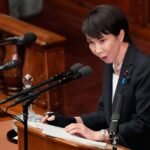(Courtesy of Getty Images)
South Korean individual investors’ US stockholdings swelled to a record $82.19 billion as of early June amid the US stock market rally, while they dumped a net 11.5 trillion won ($8.4 trillion) worth of domestic stocks this year.
Their holdings of Nvidia Corp. have nearly tripled to $11.9 billion as of June 7 since the start of this year, according to the Korea Securities Depository. The figure excluded their investments in US equity funds.
The world’s most famous AI chip producer surpassed Tesla Inc. late last month to become the most-owned stock by Korean retail investors. Its share price shot up by 150% to hit record highs this year, leading the US stock market rally.
Other leading AI companies topped the list of the aggressively-bought stocks by Korean individual investors.
Their stockholdings of Microsoft ballooned by 38.7% to $3.8 billion since the start of this year. Their ownership of Alphabet Inc., the parent of Facebook Inc. increased by 19.4% to $2.4 billion over the same period.
As of June 7, Korean individual investors together own $82.19 billion worth of US stocks, up 22% year-to-date or a $15 billion gain. The figure represents a nearly tenfold jump since the end of 2019.
“AI-related stocks drove new money inflows into the stocks,” said a stock brokerage company official.
(Graphics by Sunny Park)
The sluggish performance in the Korean stock market expedited their migration to US technology stocks that have powered the US stock market rally amid the AI boom.
“Korea is one step behind in the global AI race and rechargeable battery-related stocks, which are at the top of the market capitalization, faltered,” said a Korean stock market analyst.
“In the lack of domestic market-leading stocks, the flight of money to overseas stock markets will continue for a while,” he added.
US stocks account for 89.85% of Korean individual investors’ foreign stockholdings as of June 7, up from 58.22% at the end of 2019.
The S&P 500, a major US stock index, has gained 12.74% year to date, while the Kospi index added a mere 2.54% over the same period.
Nvidia co-founder and Chief Executive Jensen Huang
INDIRECT INVESTMENTS VIA EQUITY FUNDS
South Korean retail investors also have put an increasing amount of money into US stock funds, which have drawn a net 5 trillion won since the start of this year. They yielded an average 17.21% return over the same period.
By comparison, domestic equity funds have suffered net outflows of 1.3 trillion won so far this year, returning a meagre 2.98% on average.
Hyundai Motor Co. was the most-sold stock by Korean individual investors this year. They unloaded a net 3.6 trillion won worth of shares in the automaker this year, cashing in on its bull run the months prior.
“Individual investors have a tendency to realize profits quickly on domestic stocks even if they are on the rise,” said Kim Seung-hyun, research head at Yuanta Securities. “This tendency is getting stronger as they are increasing global stock investments.”
By Tae-Ung Bae
Btu104@hankyung.com
Yeonhee Kim edited this article















